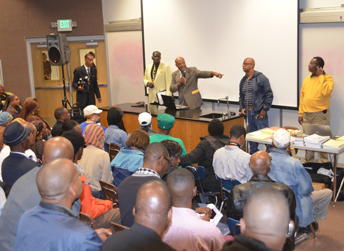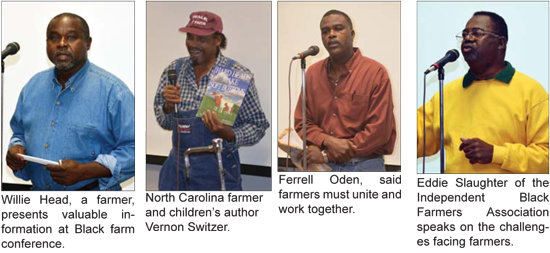Progress, solutions for challenges facing Black farmers
By Starla Muhammad -Staff Writer- | Last updated: Oct 22, 2013 - 11:18:32 PMWhat's your opinion on this article?

Dr. Ridgely Abdul Mu’min Muhammad (with microphone) introduces Black farmers. Robert Binion (blazer), Michael Stoval (striped shirt) and Eddie Slaughter (far right).
|
One of the many highlights of the intense day-long conference was Black farmers getting the chance to share struggles often ignored by mainstream media. It also presented an opportunity for networking, future collaborative efforts and focus on current programs dealing with aspects of agriculture.
“In the past, the Black farmers have been concerned with fighting the U.S. Department of Agriculture. However, because of 14 years after Pigford and the USDA doing the same things they were doing before Pigford, the farmers now have finally decided they are tired of waiting on the USDA to do the right thing and they are ready,” said Dr. Ridgely Abdul Mu’min Muhammad manager of Muhammad Farms and national student minister of agriculture for the Nation of Islam.
Pigford is the 1997 federal lawsuit brought by 400 Black farmers against the USDA for racial discrimination against the farmers who were denied loans and assistance. Thousands of Black farmers have been forced out of business and Blacks have lost acres of land over through the years, said critics of USDA policies.
In 1910 Blacks owned 16 million acres. In 2010 the number was 3 million acres. Other challenges Black farmers include the high price of farm equipment and supplies, distribution and marketing.
The Black farmers are ready to move toward nation building, said Dr. Muhammad who Oct. 19 presented the concepts for the conference to the group, National Independent Black Farmers.

|
“For the people to help them, they must help the people. They (Black farmers) must know that the people need them. One of the main things we are trying to do with this program is like a science systems project in terms of solving problems. First we observe what the problem is, we get the problem out and we talk about possible solutions,” said Dr. Muhammad.
Despite lawsuits, discrimination against Black farmers by the USDA is still going on and getting worse, charged Robert Binion of the National Independent Black Farmers.
“Until Black America whether you are Christian, whether you are Muslim if you don’t eat you get hungry, if I don’t eat, I get hungry. If we don’t come together with unity, if we don’t unite and stop looking at who we are but what we are doing to get where we need to get,” he said.
Mr. Binion has been organizing and fighting on behalf of Black farmers for years. He along with others plans to head to Washington, D.C. before the end of the year to protest continued mistreatment of Black farmers and denial of thousands of claims stemming from the Pigford lawsuits. The goal is for at least 2,000 people to participate.
Several other Black farmers attended that had their claims denied and spoke of the constant battles for justice.
The Future of Farming and Food in America Black Farmers Conference held at Booker T. Washington High School also brought together a wide array of agricultural professionals including farmers, urban and rural gardeners and those with little to no background but a desire to learn and help.
Sessions were presented on “A New System for Food Production, Financing and Distribution,” “Legal Issues with the USDA,” “Strategies to Reunite Our City and Country Cousins Around this Food Issue,” “Developing New Farmers and Agricultural Entrepreneurs for Our Future,” “Value Added Processing for Farm Commodities” and “Strategies to Start a Movement.”
Marketing and distribution
With so much processed food on the market; people are not buying fresh, raw food and cooking it from scratch in the kitchen like in generations past. Since farmers produce raw and not processed products, to support them Blacks get back into the knowledge of cooking and baking.
“If you would stop eating the processed foods and start getting the raw foods and cooking from scratch, then the Black farmer can sell directly to you. He can make money, you can save money and you can save your live and your family’s health,” said Dr. Muhammad.
In turn, Black farmers must expand to “Value Added Processing,” which means cultivating the raw product into additional goods to be sold on the market.
For attendees that travelled near and far reactions to the information presented left many shocked to learn what was really happening in the agriculture industry. Many felt inspired to help.
Barry Muhammad traveled with his three children, Farad 16, Furqan 14, Amirah, 12 from New York City because he wanted to encourage them to study and grasp the importance of Nation-building and what it takes, he said.
His son, Farad Muhammad, said he was shocked to learn land could be purchased so much cheaper in rural areas than in Harlem, where he lives.
“What kind of stuck out to me the most is when Dr. Muhammad said that you could get pieces of land that are cheaper than where you’re living at. Right now I’m living with my mom and she’s paying like $3,000 for a small apartment,” said the teen. Hearing the information sparked Farad’s desire have his own land one day.
“You have to be knowledgeable about what you’re putting into your body because it does impact the way we think and function and so I love the aspect that they talked about like getting together. It’s kind of like very tribal where we work together in a community to accomplish the task of the farm and I think that’s fabulous,” said Ms. C.K. Hugley of Addison, Ala.
Blacks many times have forgotten how to work together, she added.
“Food is a priceless commodity just like water and one of the things that was very surprising to me is how we are losing the control to grow our own, you know, saving our own seeds. I thought that was very shocking, that there are entities out there that would take away those types of essential freedoms such as feeding ourselves.”
Representatives from Pure Milk Farms in Houston, Truly Living Well and other urban gardening and agricultural programs presented information about current and future initiatives for people of all ages to learn more about growing food.
During the conference sign-up lists for several task forces including Legal issues with USDA, New Production, Transportation and several others were available for those wanting to working together after the conference.
As land in various areas of the country like Detroit is being sold for cheap prices, the time for Blacks to begin buying land is critical, said organizers.
“The main thing we got over in this conference is that the people know now that they are at war. They know now the U.S. Department of Agriculture has been fighting against the Black farmer ever since the Black farmer got land,” said Dr. Muhammad.
INSIDE STORIES AND REVIEWS
-
-
About Harriett ... and the Negro Hollywood Road Show
By Rabiah Muhammad, Guest Columnist » Full Story -
Skepticism greets Jay-Z, NFL talk of inspiring change
By Bryan 18X Crawford and Richard B. Muhammad The Final Call Newspaper @TheFinalCall » Full Story -
The painful problem of Black girls and suicide
By Charlene Muhammad -National Correspondent- » Full Story -
Exploitation of Innocence - Report: Perceptions, policies hurting Black girls
By Charlene Muhammad -National Correspondent- » Full Story -
Big Ballin: Big ideas fuel a father’s Big Baller Brand and brash business sense
By Bryan Crawford -Contributing Writer- » Full Story






 Click Here Stay Connected!
Click Here Stay Connected!








